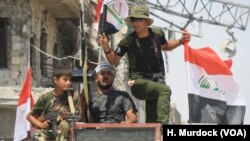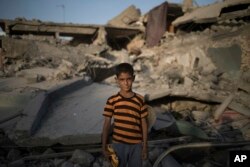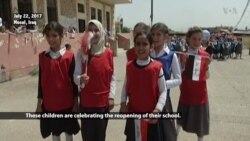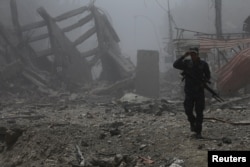Just days after Iraqi forces evicted Islamic State (IS) militants from the last parcel of land that they controlled in Mosul, Iraqi government officials say they are ready to rebuild the war-torn city and return an estimated 1 million displaced civilians to their homes.
Officials from the Iraqi Ministry of Planning told VOA that they had drawn up a 10-year plan to reconstruct the city, which came under full control of U.S.-backed Iraqi forces last week.
"This is a broad plan that will hopefully start in the beginning of next year and continue until 2027," Abdul Zahra al-Hindawi, ministry spokesperson, told VOA. "The plan will cost around $10 billion."
Al-Hindawi said the government of Prime Minister Haider al-Abadi was not able to provide the entire planned budget, but its allies have shown willingness to step in and provide assistance.
Al-Hindawi added that a major conference would be held in Washington this month where Iraqi officials would discuss details of their plan and how allies and international organizations could contribute to the rebuilding.
Western side ravaged
Mosul, Iraq's second-largest city, came under IS control in mid-2014. Months of IS occupation and the Iraqi battle to oust the terror group reduced much of the city's western side to rubble.
Watch: With IS Gone, Mosul Schools Reopen in Process That Could Take Months
The U.N. has warned that the road for Iraq to reconstruct the city and return civilians will be "extremely challenging" as the country wrestles with IS in other pockets that the terror group still holds.
Lise Grande, the U.N.'s humanitarian coordinator in Iraq, said that of the 54 residential districts in western Mosul, 15 were "basically flattened," while the rest were moderately or lightly damaged.
The cost of stabilizing western Mosul areas and making them livable could surpass $700 million, she said.
"That is double the estimate for stabilization due to fighting, which was so fierce and so much worse than what anyone else experienced," Grande told journalists in New York on Monday while speaking via videoconference from Baghdad.
More evacuations?
She added that U.N.'s top priority was to evacuate civilians who might still be trapped in Mosul's Old City.
"The fighting may be stopping but the humanitarian crisis has not," she said.
The U.N. agency estimates that close to 1 million civilians have left the city since the beginning of the Iraqi offensive last October. Some 700,000 people are from western Mosul, where most destruction from the fighting occurred.
While returning normalcy to western Mosul's Old City may take months, Iraqi officials said they expected most of the civilians from less damaged areas to return home after security has been restored.
"Fifteen percent of people have already returned home in eastern Mosul," Darbaz Muhammad, the Iraqi minister of migration and displaced, told VOA this month.
Muhammad pleaded for international support to speed up the return of more Mosul residents as 100,000 more civilians are expected to flee their homes by the end of this year, when Iraqi forces start an assault on IS in other areas of Nineveh, Anbar and Kirkuk provinces.








